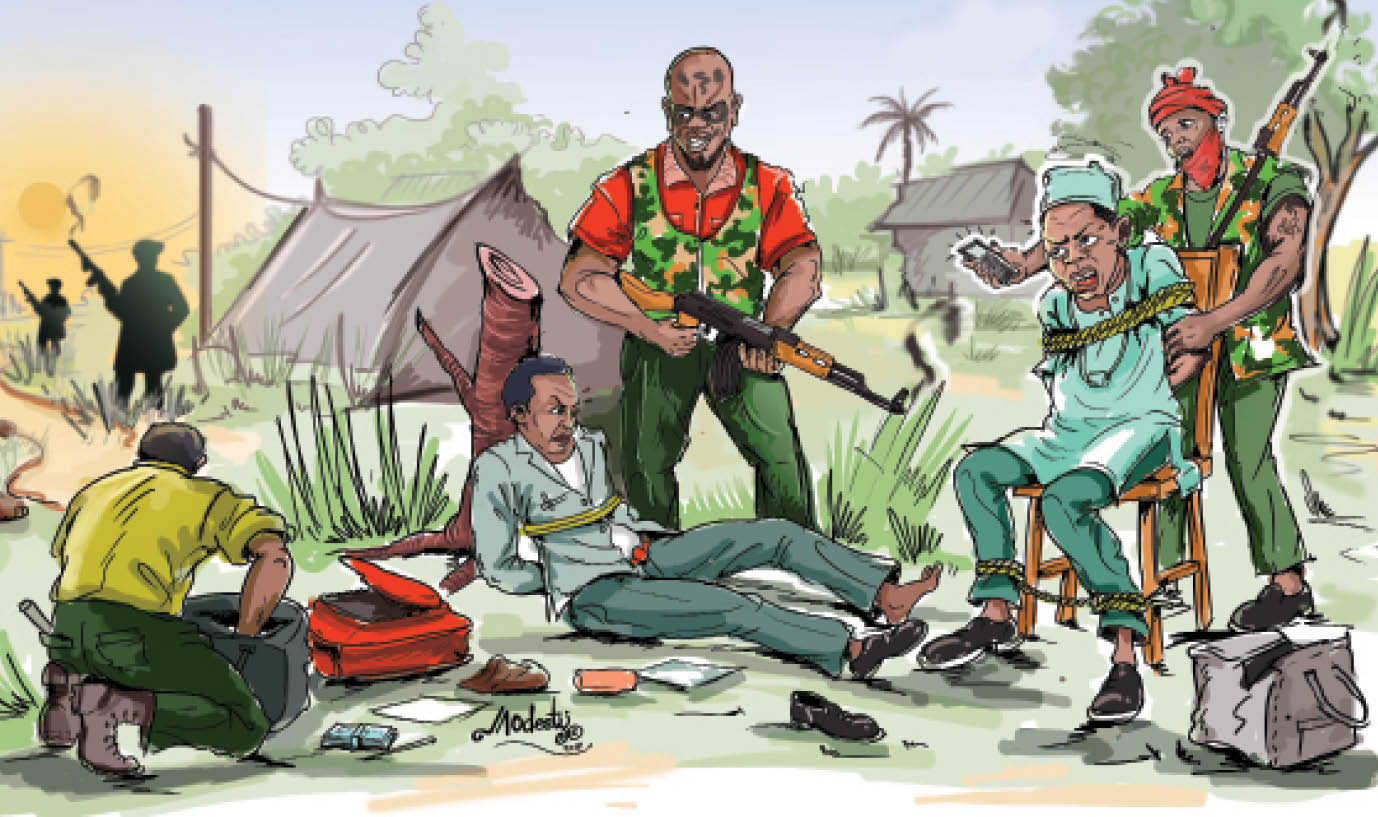Between 2011 and April 2020, Nigerians lost at least $18.34 million to kidnappers as payments made to secure the release of their loved ones, a new report by SBM Intelligence has shown.
Of this figure, the last four years (between January 2016 and March 2020) accounted for the largest proportion with nearly $11million exchanging hands between kidnappers and their victims.
According to the 21-page report, seen by our reporter, River state had the highest number of kidnap incidents with 120, while Kaduna came second with 117.
READ: Kidnappers kill man after collecting ransom
Three other states from the South-South region joined Rivers in the top 10 list: they are Delta with 96, Bayelsa with 85, and Edo with 55 kidnap incidents.
The report, which was titled “Nigeria’s Kidnap Problem: The Economics of the Kidnap Industry in Nigeria”, noted that “insecurity is increasingly becoming a profitable venture for its merchants which looks set to rival the illegal arms running businesses.”
On fatalities, the report said, “the high fatality rate of kidnap attempts in Borno and Adamawa states can be directly linked with the activities of the Boko Haram terrorist group, which is responsible for most of the attempts and a few others linked to Fulani herdsmen militia.”
“However, parsing the data of fatalities per attempt for the other Northern states reveals that until late 2018, the fatalities were relatively low as kidnap attempts were targeted at specific intended victims (mostly politically-exposed persons, business people and their close relatives, or expatriates),” it added.
READ: Kidnapped Abaji LEA scribe’s wife, trader released after N3.4m ransom
Banditry, according to the report, also contributed to the sudden uptick in fatalities per attempt especially in Zamfara and Katsina states, as well as in Kaduna and Niger states.
“These bandits have also been involved in kidnapping besides attacking villagers and travellers, or doing both at the same time.
“As these kidnaps are less targeted at specific persons, the bandits are less deliberate in avoiding the deaths of their victims compared to earlier kidnap attempts which appeared to have specific targets in mind.
“Overall, Nigeria is becoming less safe each year,” the report stated.
SBM Intelligence said it also found that kidnapping has increased in almost all states, but the sharpest rises have been in Kaduna, Rivers, Katsina, Zamfara and Taraba, while only Bayelsa in the entire country, saw a fall in the number of incidents compared to the period of 2011 to 2015.
“One reason why kidnap for ransom has come to stay is the economics surrounding it.
“The data available to SBM indicates that in US dollar terms, between the $545,000 paid to secure the freedom of Ernest Ohunyon in Edo state in November 2011, and the $6868 paid to free Ojo Ekundayo and Benjamin Iluyomade in Ondo state at the end of March 2020, at least $18,343,067 changed hands between victims and kidnappers.
“It is important to point out that in the earlier years, there were fewer incidents, and larger amounts changed hands.
Now there are a lot more incidents for smaller amounts, but the sheer number of incidents, speaking to the democratisation of the kidnap industry, means that the kidnap economy now makes more money,” it stated.
The report cited examples of suspected kidnap kingpins like Hamisu Bala, aka Wadume (in the North West and North Central) and Chukwudi Onuamadike, a.k.a Evans (in the South).
“Wadume was said to have made millions from ransom.
“His gang carried out a kidnapping in Takum on 16 February 2019 of a petrol dealer Usman Garba.
“The Wadume gang demanded N200 million ransom.
“Despite that relations of the victim were able to hand over N106.3 million, he was killed,” the report said.
Daily Trust reports that both suspected kingpins have been arrested and are currently having their cases being heard by courts in Lagos and Abuja.
In the past year alone, the Abuja-Kaduna highway remained one of the hotbeds of kidnapping in Nigeria.
While the police made several arrests in 2019 as they did in preceding years, the road remains a nightmare for users.
The chairman of the Universal Basic Education Commission (UBEC), Dr. Mohammad Abubakar and his daughter, Yasmin, were one of the numerous victims on the road.
Further down south, there were several high-profile cases of kidnappings including the abduction of Justice Abdul Dogo of the Federal High Court, Ondo State, who was kidnapped in Edo State.
Also, Justice Chioma Nwosu-Iheme of the Court of Appeal, Benin Division, was abducted in October 2019, with her orderly shot dead.
In April 2020, Alhaji Adamu Mohammed, the elder brother to Bauchi State Governor, Bala Mohammed, was released by kidnappers after spending 14 days in captivity with reports suggesting that his release came after the payment of N50million as ransom.

 Join Daily Trust WhatsApp Community For Quick Access To News and Happenings Around You.
Join Daily Trust WhatsApp Community For Quick Access To News and Happenings Around You.
